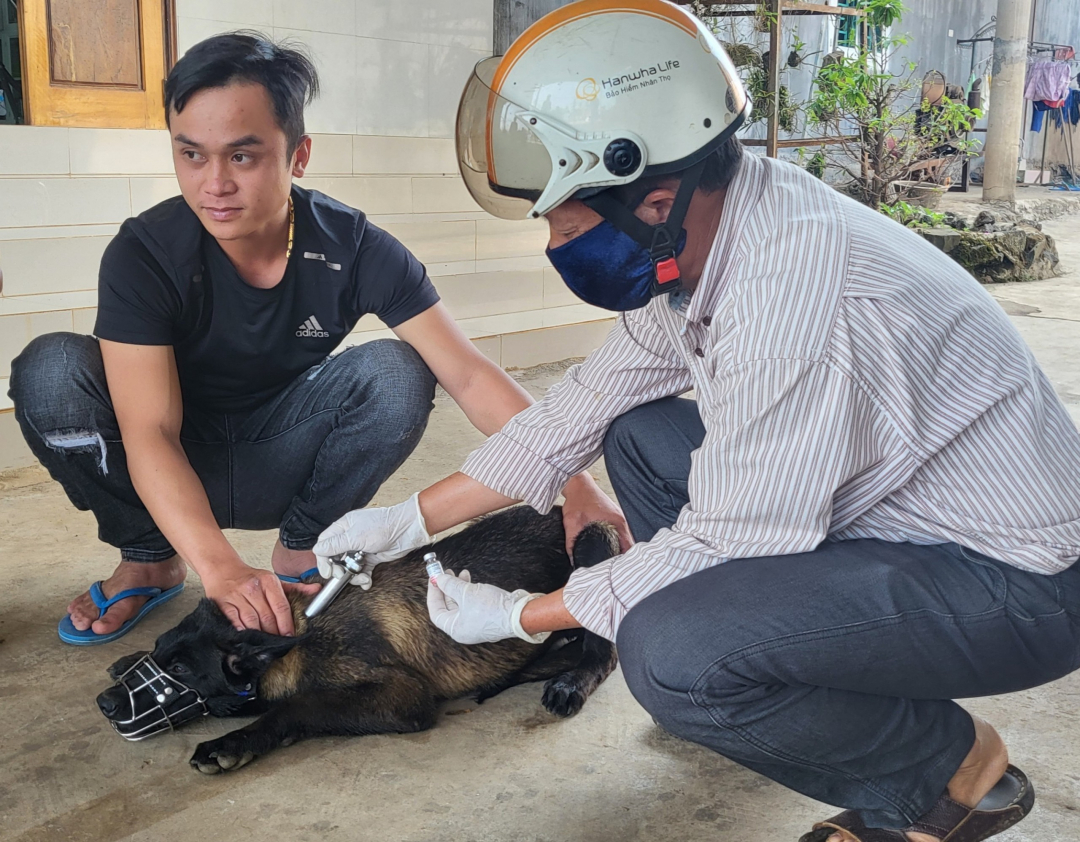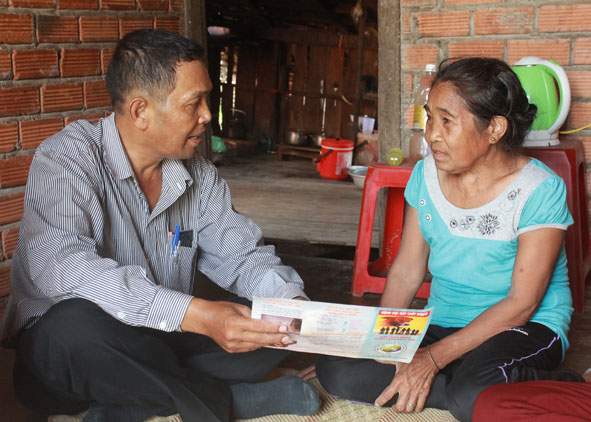07:53, 17/05/2023
Currently, hot weather conditions are favorable for the outbreak of rabies in dogs and cats, and also pose a potential risk of increased rabies cases in humans. Authorities are actively implementing measures to control and prevent rabies outbreaks.
A series of rabies cases and deaths have occurred.
According to statistics from the Provincial Center for Disease Control (CDC), in the past two years, there have been 4 cases of rabies infection and death recorded each year. Since the beginning of this year alone, there have been 2 cases of rabies infection and death. Most recently, a 78-year-old woman (in Jung 2 hamlet, Ea Yông commune, Krông Pắc district) was bitten on the finger by a dog in December 2022 but did not receive a rabies vaccine, leading to the onset of rabies and death on May 9th.
 |
| Vaccinating dogs against rabies in Ea Kuang commune, Krong Pac district. |
According to Dr. Le Phuc, Deputy Director of the Provincial CDC, the most concerning aspect of rabies in Dak Lak currently is that, in addition to detecting rabies patients and deaths, veterinary tests have also revealed many rabies viruses in the dog population. This indicates that if the dog population is not properly managed, controlling rabies in humans will be difficult.
Currently, the provincial CDC, in coordination with the veterinary agency, has advised the agricultural sector and the health sector to advise the Provincial People's Committee to issue a plan for rabies prevention and control throughout the province. Given the risk of a rabies outbreak, the most important task now is to strengthen rabies vaccination for dogs; and to promote public awareness about dog management. At the same time, budget allocation is needed to provide free rabies vaccinations for certain groups, including the poor, near-poor, disadvantaged people, ethnic minorities, and those living in remote areas.
In reality, there are many cases where people, after being scratched or bitten by dogs or cats, do not get vaccinated against rabies but instead treat themselves with traditional medicine, leading to the disease and death. The provincial CDC has directed district-level health centers to actively promote awareness among the public about rabies prevention and control, and guide people to proactively seek medical attention when scratched or bitten by dogs or cats for proper wound treatment and vaccination. In addition, the provincial CDC has contacted a vaccine company and received a donation of 1,000 doses of rabies vaccine to be administered free of charge to disadvantaged individuals. Currently, free rabies vaccination is being conducted at the provincial CDC's vaccination center.
Take decisive action to prevent the spread of rabies.
According to Mr. Mai Xuan Ly, Deputy Head of the Provincial Department of Animal Husbandry and Veterinary Medicine, the total number of dogs and cats in the province is currently over 360,000 (including over 170,000 dogs and over 190,000 cats). Despite the efforts of relevant authorities, rabies prevention and control among dogs and cats still faces many difficulties, especially the low vaccination rate. In 2022, the rabies vaccination rate for dogs and cats in the province only reached over 30% of the total population. This is due to the practice of letting dogs and cats roam freely in fields and farms, making them difficult to catch for vaccination. Furthermore, many households lack sufficient awareness of rabies and therefore do not actively participate in vaccinating their pets.
 |
| Healthcare workers are educating the public about preventing rabies in humans. |
In March and April of this year, the Provincial Department of Livestock and Veterinary Medicine implemented a mandatory rabies vaccination campaign for dogs and cats throughout the province. During this campaign, ethnic minority households, families receiving social welfare benefits, and impoverished households received free vaccinations, while other cases were charged 22,100 VND per dose per animal. Currently, all 15 districts, towns, and cities in the province are actively implementing rabies vaccination for dogs and cats, combined with raising public awareness about the risks and harms of not vaccinating their animals against rabies.
To increase the rabies vaccination rate for dogs and cats and reduce the risk of death from rabies, Dak Lak province has set a target of 70% vaccination rate for the total animal population in the 2022-2025 period and 80% in the 2026-2030 period. Simultaneously, it aims to promote and encourage people to get supplementary vaccinations annually, in addition to the mass vaccination program. However, to achieve this goal, localities need to effectively manage dog and cat breeding and intensify public awareness campaigns so that every citizen knows how to prevent diseases in their dogs and cats.
The Provincial Department of Livestock and Veterinary Medicine recommends that, to effectively prevent and control rabies, people who own dogs and cats must register them and keep their pets within the family's premises. When letting dogs and cats out onto the street, they must be muzzled, leashed, and accompanied by a person to prevent them from biting people. Owners of dogs and cats must vaccinate their pets against rabies as required. If a dog or cat shows any unusual signs, it must be isolated for observation, and the veterinary staff, local authorities, or the nearest veterinary agency should be notified for coordinated action.
Kim Oanh
Source link



































































































Comment (0)